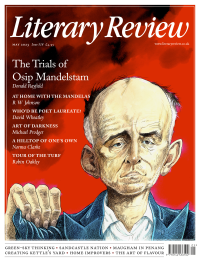Tom Williams
Marriage of Convenience
The House of Doors
By Tan Twan Eng
Canongate 306pp £20
Tensions between the public and the private lie at the heart of Tan Twan Eng’s The House of Doors, a novel predominantly set in Penang in 1921 and immersed in the social mores of the British Empire. Lesley Hamlyn is married to Robert, a barrister eighteen years her senior. Theirs is a polite, passionless marriage, burdened but also sustained by deep silences and long-stored secrets, the two keeping their ‘true thoughts camouflaged from each other’.
At their residence, Cassowary House, a mile outside George Town, the Hamlyns are used to a variety of guests: actors, singers, MPs and members of the aristocracy. No visit, however, is as energising and destabilising as that of the novelist William Somerset Maugham, who emerges as one of the central characters in the book. A friend of Robert from decades before, Maugham is accompanied by his reckless secretary and lover Gerald Haxton.
Tan’s storytelling is perfectly poised, moving between first-person narration by Lesley and a third-person account that follows Maugham. Lesley is a subtly portrayed society hostess whose identity is conditioned by her deep attachment to Penang. Born and brought up in the area, she speaks fluent Malay and claims to have no intention of moving, even as she is gently encouraged to relocate to a drier climate for the sake of Robert’s worsening lung condition.
Maugham bears his own wounds with him as he tours the world with Gerald, seeking out ideas for new stories. At the beginning of the book, he is coping with the fracture of his sham marriage to Syrie back home, his own recent illness and, at the moment of arrival in Penang, the discovery that he has lost all of his money through a failed investment in a New York brokerage firm. He and his friends are also ‘reeling from the death knell rung across England by poor Oscar Wilde’s fate’.
At first wary and even condemnatory, Lesley soon finds that Maugham prompts her to open up in a way that she cannot with her husband. Maugham declares to Lesley: ‘I see myself as an anonymous gentleman in the parlour, a traveller sitting in the half-shadows, ready and … willing to listen to anyone with a tale to tell.’ The lure prompts her to launch into a story of her own: she recalls how a decade earlier her married friend Ethel Proudlock was arrested for the murder of another Englishman.
This is a fascinatingly layered novel, drawing upon a range of different modes and themes – patriarchy, political turmoil, illicit love affairs and concealed sexuality – with a courtroom drama (based upon real events, which also inspired Maugham’s story ‘The Letter’) at the heart of it. The book is Tan’s first since the publication of the Booker-shortlisted The Garden of Evening Mists in 2012, and like its predecessor it moves between different time periods while immersing us in the history of 20th-century British Malaya. A particularly compelling strand of the story involves the arrival of the Chinese political thinker (and future leader) Sun Yat Sen, who plans his revolution from Penang. The scenes centred on his underground political party, the Tong Meng Hui, present an invigorating contrast to those featuring high-society parties. Lesley is fascinated by Sun’s blistering speech-making: ‘I felt that he was binding all of us to a covenant, a covenant for a future he would sacrifice everything for, even his life, to bring into existence.’
What is most wonderful about this book is the lush, luxuriant descriptions of Penang, a land of ‘cloying humidity’. The sea is ‘emerald and turquoise, chipped with a million white scratches’, while on Penang Hill, ‘dragonflies with stained-glass wings stitched invisible threads in the air’. Through this deceptively lulling atmosphere, Tan has woven a superb, quietly complex tale of love, duty and betrayal.

Sign Up to our newsletter
Receive free articles, highlights from the archive, news, details of prizes, and much more.@Lit_Review
Follow Literary Review on Twitter
Twitter Feed
It wasn’t until 1825 that Pepys’s diary became available for the first time. How it was eventually decrypted and published is a story of subterfuge and duplicity.
Kate Loveman tells the tale.
Kate Loveman - Publishing Pepys
Kate Loveman: Publishing Pepys
literaryreview.co.uk
Arthur Christopher Benson was a pillar of the Edwardian establishment. He was supremely well connected. As his newly published diaries reveal, he was also riotously indiscreet.
Piers Brendon compares Benson’s journals to others from the 20th century.
Piers Brendon - Land of Dopes & Tories
Piers Brendon: Land of Dopes & Tories - The Benson Diaries: Selections from the Diary of Arthur Christopher Benson by Eamon Duffy & Ronald Hyam (edd)
literaryreview.co.uk
Of the siblings Gwen and Augustus John, it is Augustus who has commanded most attention from collectors and connoisseurs.
Was he really the finer artist, asks Tanya Harrod, or is it time Gwen emerged from her brother’s shadow?
Tanya Harrod - Cut from the Same Canvas
Tanya Harrod: Cut from the Same Canvas - Artists, Siblings, Visionaries: The Lives and Loves of Gwen and Augustus John by Judith Mackrell
literaryreview.co.uk